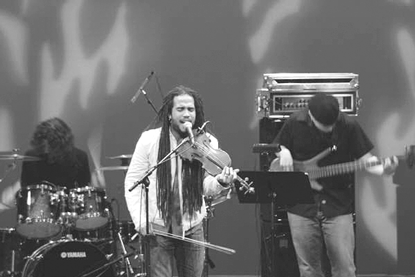By Steven Snyder
Daniel Bernard Roumain — better known in music circles as DBR — is a violinist and composer who works like a chef, decorating a main course of classical music with a dose of hip-hop, a dash of rock-and-roll, and just a pinch of R&B. The genre-bending musician is equally at home in a classical recital in Chicago one week and a head-banging rock crowd at the Knitting Factory the next. And he sees the blurring of these musical definitions — the ease with which any musical genre can be accessed in the digital age — as a wonderful thing.
“I’ve read that [AOL Time Warner Chairman and CEO] Robert Parsons has a deep love and affection for both Eminem and Lynyrd Skynyrd,” Roumain said, noting that Parsons is black. “And I’d like to think that the grand wizard of the Ku Klux Klan might have the same thoughts. They might hate each other, but they may like the same music, and so I ask you, how amazing is music?”
Roumain, who tours across the country with his ensemble, The Mission, said he always sought out a balance between his classical music studies and his popular music tastes. In addition to his own music, which acts as a meeting point between these two worlds, he has also worked with such avant-garde figures as choreographer Bill T. Jones and composer Philip Glass. But the more Roumain has experimented with musical genres, the more he said he has found himself scrutinized by both the academic world of classical music and the mainstream world of pop music fans. Sequenza21.com, for instance, a weekly classical music e-zine, has criticized Roumain so harshly, the violinist said he contacted the site’s critic in frustration.
But for all his detractors, Roumain has also won plenty of acclaim for his experimental style in media outlets like The New York Times, which called one of his works the third best classical moment of 2003. He says the key to an artist’s — and an art form’s — longevity is an ability to grow and evolve, and points to successful pop artists like Prince and Madonna as performers who were able to change with the times and find a new way to satiate their fans’ mercurial tastes.
“If you look at Prince, look at how much he has evolved from his first to his last album. And now look at the New York Philharmonic over the past 50 years — has it really evolved in the same way?
For his performances this Thursday and Friday, Roumain is reviving his “Voodoo Violin Concerto No. 1,” which was originally commissioned for The Kitchen in 2002. In it, he said he juxtaposes the voodoo ceremonies of Haiti, the home of his fiancé, with his own Catholicism, mixing a first movement that is very loud and representative of a soul becoming possessed with a second movement that is more prayer-like and reverential.
“It reflects the binary nature of my culture, and of my religious upbringing,” he said.
Beyond “Voodoo,” DBR & The Mission will also be performing a number of pieces written for string quartet as well as electric and solo violin, including “Event Pieces,” “Beat Pieces” and “Hip-Hop Studies and Etudes,” which Roumain said will bring a bit of the club experience to The Kitchen’s stage.
“I… deal with black music expressions — hip hop, soul, R&B — and then I…combine them within classical music forms,” said Roumain. “It’s a hybrid form, but a very specific hybrid form which gets more and more specific as I get older.”







































